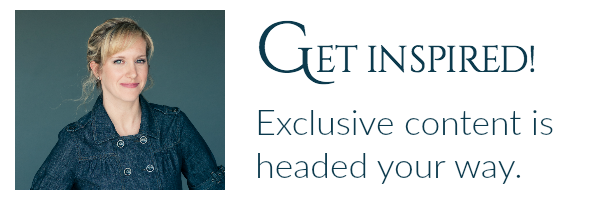by Kelli Stuart | Like a River From Its Course, Novel, Ukraine, World War II, Writing
Writing a historical fiction novel is daunting.
Setting a historical fiction novel in World War II Soviet Union might just be crazy.
When I set out to write my novel, I wanted to develop a story that was as historically accurate as possible while still offering myself creative license. This proved to be an overwhelming task given the vast history of those years, and the many different conflicting accounts of what happened.
There were times when I wanted to give up altogether.
Other times, I wondered if I should just make it Science Fiction. Hitler could be a Vampire, and all his cronies would be various forms of the undead.
It would’ve been a hot seller, but the premise sounded dumb, so I pressed on.
When it came to writing the Ukrainian characters, the stories flowed (almost) easily. I knew their stories, and so fictionalizing the tale didn’t feel like a chore. But writing the story of Frederick Herrmann, a young Nazi soldier hell-bent on carrying out the mission and task that his country and set before him left me almost paralyzed at times.
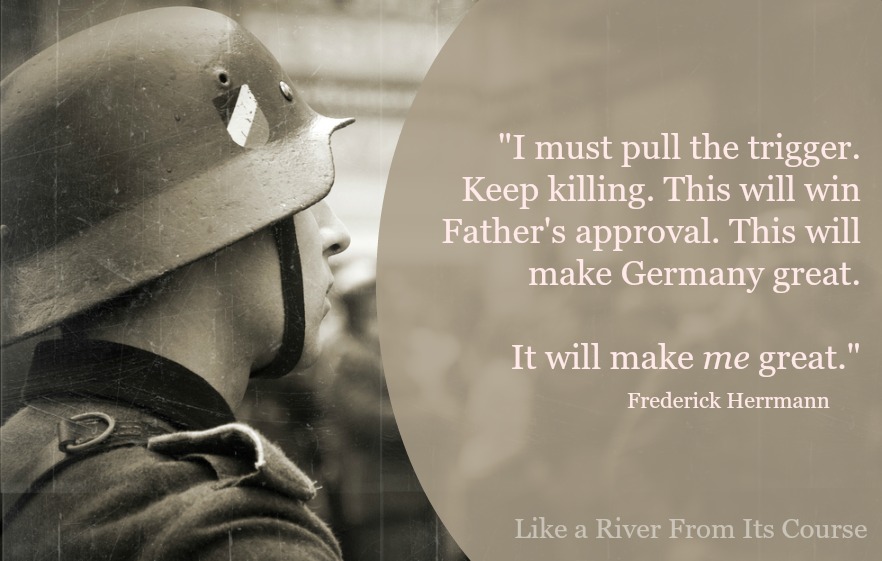
I am a bit of an idealist. The actions of the Nazi soldiers was something I couldn’t quite comprehend. How could so many young people follow so blindly the ideology of a clear tyrant and psychopath? How could they kill so robotically? And how did they live with themselves later?
I needed a reason, and so I set out to find one, but the research often led me to images that were so horrific, I had to step away. There were days when I hated Frederick and all that he stood for. I didn’t want to write of such atrocities, because I didn’t want to believe that people could really be that evil.
Frederick is the only purely fictional character in my book. While all of the other characters are based on the stories of men and women I met in Ukraine, Frederick came a little more reluctantly from my imagination.
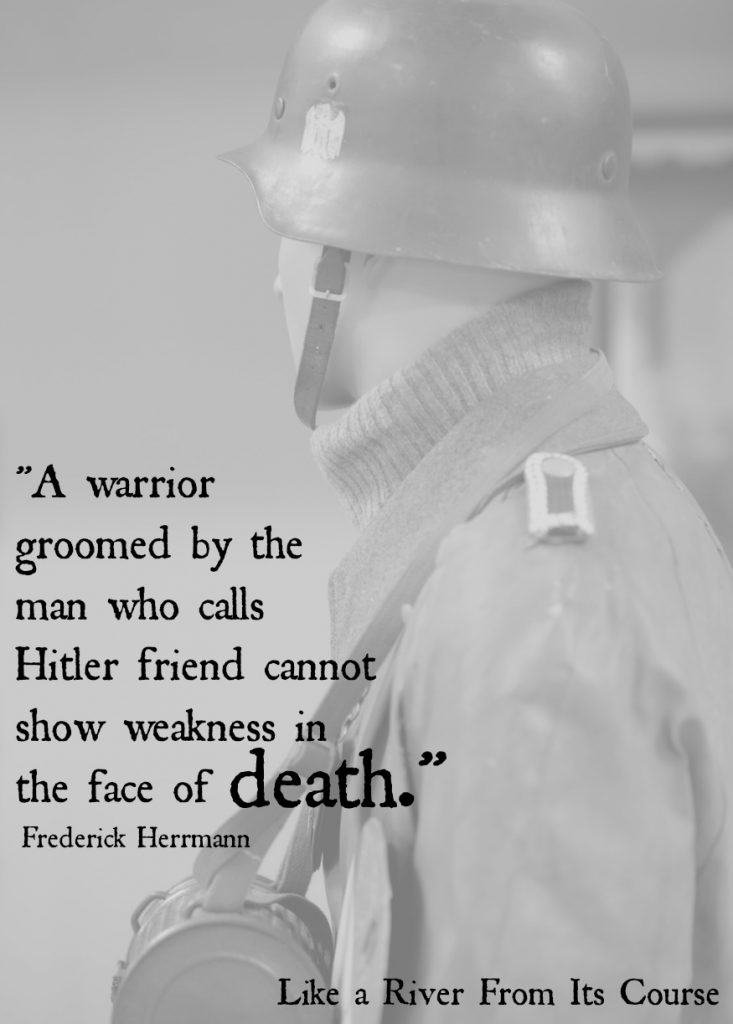
I fought for Frederick. I wanted to redeem him somehow. I wanted there to be a reason for his wickedness, and in the end I think there was some redemption for his character, though it wasn’t what I expected when I began writing.
I won’t spoil the story for you, but I will tell you that Frederick eventually became one of my favorite characters to write. By the end of the story, I no longer hated him. I pitied him, and I pitied all the boys like him – the real ones who believed that they were right and justified in their mission.
I don’t know what the after effects of the war were for those who pulled the trigger senselessly and brutally. I don’t know how the killings of Babi Yar, where 33,771 men, women, and children were slaughtered in two days time affected the young men who did the killing.
I have to believe that there were lasting effects. I have to believe that for many, though I suspect not all, of those young men, the images that they saw, that were caused by their own calloused hands, haunted them for the rest of their lives.
How could they not?
Frederick Herrmann was a young man swallowed by the ideals of his country, and by a desperate need to please his father. His story may have been fictional, but many of his surroundings and experiences were not. The names of his commanders are the names of actual German leaders in Kiev in those years.
I set out to write a historical fiction story that stuck as close to fact as possible. Though Frederick is fictional, his story is not so unlike many of the young men from those desperate days.
In the end, Frederick became as real to me as any of the other characters.
I know some of you have read the book – what did you think? What are your thoughts on Frederick (without giving spoilers, please!)?
Also – HOORAY! – Amazon has started shipping out books! Have you ordered your copy yet?*
Amazon has also opened up the reviews section of the book, so if you’ve read the book would you consider leaving a review?
Thanks, everyone!
*affiliate link
by Kelli Stuart | News, Novel, Ukraine, veteran's stories, World War II
She sat across from me, her mouth turned up into a soft smile. With eyes crinkled at the edges, and a gentle lilt to her words, she took me back into the recesses of her memory.
It was 2003, and I was in Vinnitsya, Ukraine. Elizabeta Yepifanova agreed to meet with me on a brisk, March morning, and over a spread of tea and chocolates, she invited me into her story.
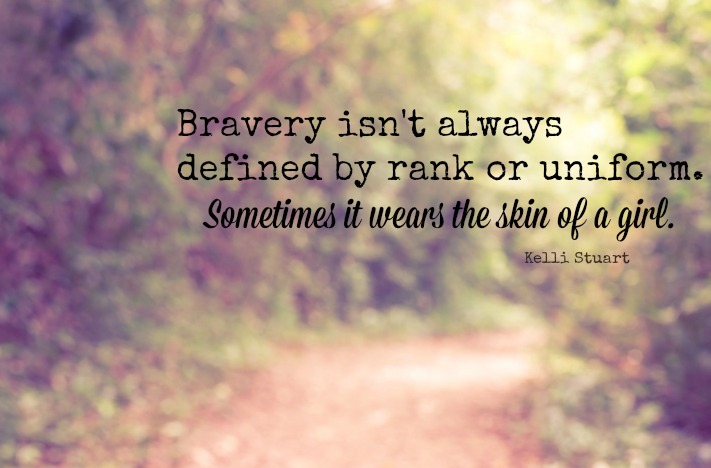
Elizabeta was sixteen when the Nazis invaded Vinnitsya. Unable to enlist in the Red Army, she found herself stuck, forced to live under the invader’s imposed law, and unwilling to stand idly by while young boys with cropped hair took over her home. She wasn’t, of course, the only one left heated with indignant pride.
A group of young men and women like herself formed a quiet group. Meeting weekly in the hushed corners of the local library, this pack of partisans made it their mission to fight a different kind of battle with the Nazis.
“We fought a psychological battle,” she told me. The interpreter sat quietly by my side, whispering Elizabeta’s every word like it was a sacred secret, and perhaps it was.
“We wanted those boys to know that though they had physical might, they did not have the power to break our spirit.” She tossed me a mischievous glance. “And we won that psychological battle.”
Not content to subject themselves to the Nazi’s rules, Elizabeta and her comrades devised secret plans to keep the German soldiers ever aware of their own infallibility. “The Germans were afraid of us,” she laughed. “We were unpredictable and shrewd. They never knew where we would strike next.”
“I got very close to a Nazi once,” she continued. “It was the most dangerous mission I participated in. But I was successful. Of course I was successful,” she chuckled. “I’m here talking with you now!”
Late one evening in 1943, Elizabeta and her friend, Sophia, walked to a nearby market where German soldiers were known to congregate, and they openly flirted with two of the Nazis.
“We got those boys to come with us easily,” she said, eyes twinkling. “We didn’t speak German, of course, and they knew very little Russian, so most of the communicating took place with gestures. But if you can believe it, I was quite beautiful then, so it didn’t take much to convince them to follow us.” I smiled, because I could believe it. Behind the wrinkles and the grey hair, Elizabeta Yepifanova had striking features.
“We lured them to our safe house and had them take off their coats in the front hall. When we saw their guns, we pretended shock and fear, and those boys were quick to remove the weapons and lay them down. They thought they’d get something from us that night, but we were the ones who got lucky.” With a slap of the knee, Elizabeta let out a hearty laugh.
by Kelli Stuart | Novel, Travel, Ukraine, veteran's stories, World War II
“It’s not fair! You’re just…you’re putting to much pressure on ME!”
With face in hands, the child ran from the room and slammed the door leaving me bewildered in the kitchen. All I asked was for help putting the dishes away.
Too much pressure?!
With a shake of my head, I left the dramatic child alone for a few minutes, because we both needed a time out. I pulled the box of old photographs down off the shelf and began rifling through. Sometimes memories bring a soothing balm to the rocky places of the present day.
When I came across the pictures from my trip to Ukraine in 2003, I let out a little yelp of joy. I’d been looking for those pictures for weeks, wanting to jog my memory of the events that so clearly marked the path for my book. I ran my fingers across the photographs, willing myself to remember the moments.
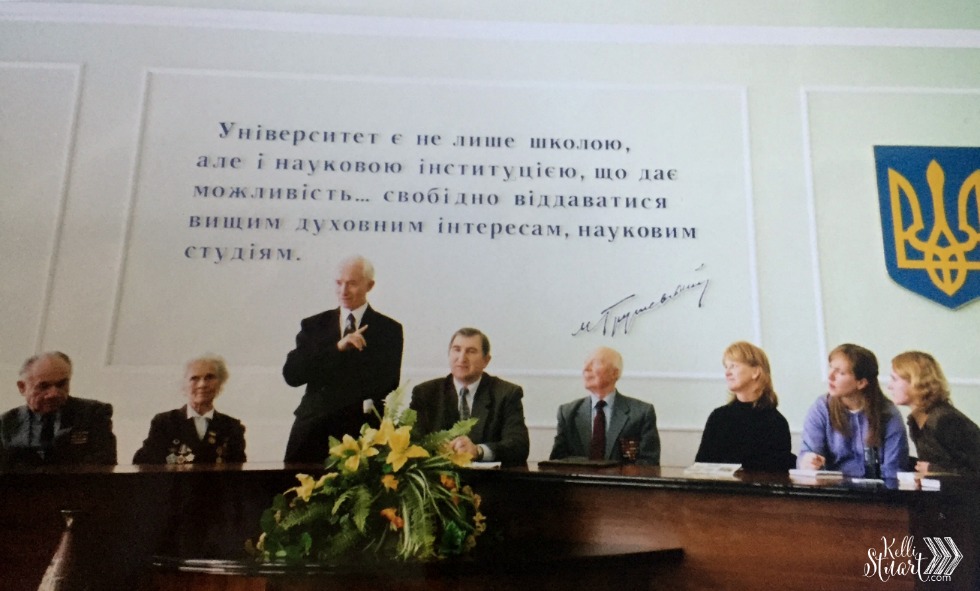
2003: A Meeting with veterans in Kam’yanets Podilsky, Ukraine.
Some of them seemed vague. The time I spent in that country was a whirlwind, and I was rather pregnant great with child, so not all the memories were cohesive. But a few were, and as I sifted through them, my dramatic child came and sat by my side.
“Who’s that?” The voice was soft, with the hint of apology floating at the edges.
“Those are men who battled evil,” I answered. “Those are men who know pressure. Real pressure. They understood suffering.”
I turned and offered a crooked smile. “Those are men who probably didn’t enjoy cleaning the kitchen, either. But they wouldn’t call it pressure. Maybe just more of an annoyance?”
A smile in return. The ice was breaking just a bit.
“Do you remember their stories?”
I looked carefully at the photo. “Not specifically,” I replied, “but I have them all written down. I’ll look them up later.”
“Why are their stories so important?” The innocent question was met with a quizzical stare, and all I could offer was a shrug at that moment. I couldn’t formulate the right answer, so I let the question hang in the air.
“Why are their stories so important?”
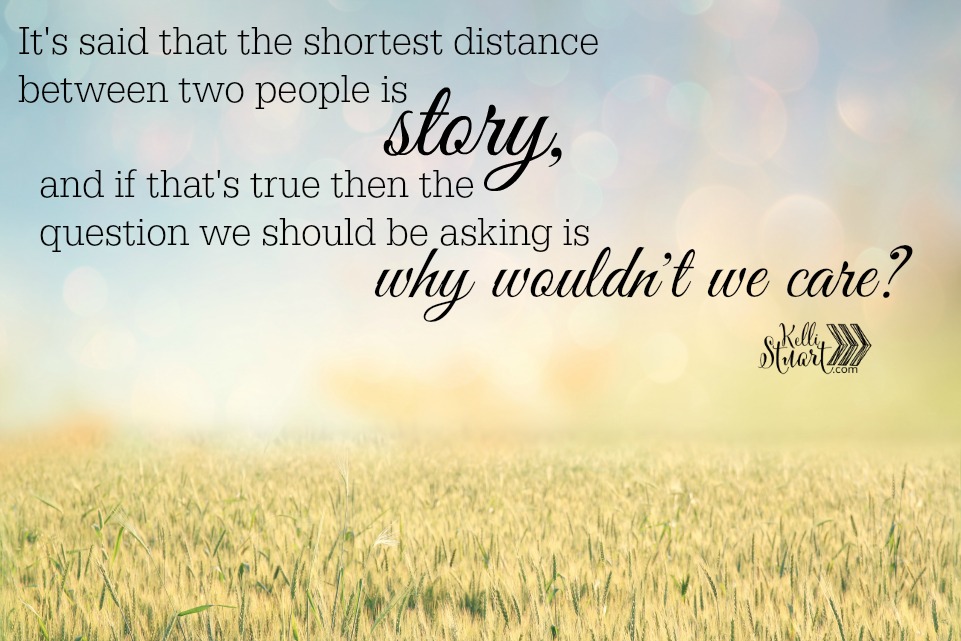
Long after the kitchen was cleaned and the house grew silent as the sun set low, I continued to mull over that one, simple inquiry.
Why are their stories so important?
These men are not American. Their stories and experiences tell of not only a time unfamiliar to most of us, but also a culture. Why is it important to tell their stories? Why should you care? Why should I care?
It’s said that the shortest distance between two people is story, and if that’s true then the question we should be asking is why wouldn’t we care?
These men stood up before their peers, and before a strange American girl, and they shared their stories. They shared them because they wanted me to know, and they wanted you to know.
They wanted us to see that the distance between us and them isn’t really all that far after all. We share the common longing for peace in a world that often quakes with violence.
We were all uniquely designed by a common Creator, and that design draws us together even if the miles, the language, and the landscape of our lives looks different.
So why are their stories important? Why should you care about the histories of a handful of men and women from half a world away?
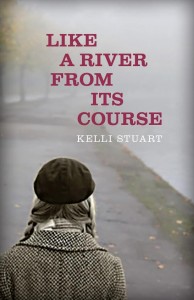 Because their stories offer the connection between then and now, and in a time when evil runs rampant and we watch the world with wide eyes, a reminder of man’s capacity to overcome evil is beautiful, indeed.
Because their stories offer the connection between then and now, and in a time when evil runs rampant and we watch the world with wide eyes, a reminder of man’s capacity to overcome evil is beautiful, indeed.
In the months leading up to the release of my book, I will offer more background on the stories and events that inspired the novel. In the meantime, visit the War Stories page to read the histories of the four people who most impacted me as I researched this novel.
by Kelli Stuart | Holidays, Inspiration, Novel, World War II, Writing

The sky was grey the day I met him. It was 2003, and I was in Kiev, Ukraine looking on a quest to speak with the men and women who’d fought valiantly in “The Great Patriotic War.”
Leonid sat behind his desk and looked at me warily, not generally accustomed to people wanting to hear his story. His back was bent, his face bearing the lines of one who’d lived through hell on earth. Through the translator, he asked one simple question.
“Why do you want to know?”
I was a 24 year old pregnant American in Ukraine with a thirst for history. I wanted stories. I wanted to hear them and to tell them. But this man – this man had lived the stories. They weren’t romantic, and they certainly wasn’t as neat as most movies had made them seem. Leonid’s history was alive with the sounds of men dying. He could smell the gunpowder and fear, all mingled together in a story of heartache.
He was a veteran.
The men and women who lived this history are slowly fading into the past. Their stories are all we have left, and we must be willing to listen. We must gather them, and preserve the words if we cannot preserve the sights and sounds. This is why I continue to search for the right publisher for my novel. Because I believe the stories must be told.
We must continue to write books and make movies so that these veterans will understand that we want to know because we want to honor them. And for the men and women who are serving today, the ones living new stories, fighting against our own modern day terrors, we must show them that we respect their sacrifice. That their stories are worth hearing and telling and honoring, too.
“Why do you want to know?” he asked.
“Because I believe your story is worth telling,” I told him.
His eyes glistened and he leaned back in his chair, folding his hands gently in his lap. He took a moment to gain his composure before speaking.
“I was 16 when the Nazi’s invaded my country. My father went to the front immediately and died very quickly. Though I was not yet old enough to enlist, the Red Army allowed me to fight as a volunteer. When I was 17, I entered the front lines.
The men in my unit were not much older than me. They were 18-25 years old, all of us boys. We were afraid, but we had courage in our hearts.
There are a lot of stories I could tell you of those years, but I won’t tell you all of them. Most are too painful. I do remember one evening, though. It was near the end of the war, and we knew that we were winning. We were in Russia at this time, and the winter months were finally ending. It was still cold, but we could feel spring coming. We were by the fire after another long day of walking. We hadn’t seen battle that day, but we knew we could meet a fight at any time. That was part of the fatigue, knowing that we would run into the battle at any moment.
We heard a sound coming from the trees behind our camp and we all stood up. I remember my heart beating so fast I could hardly breathe. A man shouted from the darkness in a language I recognized, but didn’t understand. He was speaking English.
My friend, Pavel, spoke English and responded. He told us to put down our guns because these men were friends.
The Americans sat with us by the fire that night. They gave us cigarettes and vodka. I didn’t understand the conversation, but I remember the camaraderie we all felt. We were different, but we were also the same. We were young men who had survived. We had seen the very worst of mankind, and the very best of mankind. We were all scared, and we were brave.
We were soldiers.
They left the next morning, and not many months later we got news that Hitler was dead. This is the story I want you to know. I want you to know that those years were dark and painful, but there were good things that happened, too. I will always remember that night when I sat with friends from another land.
These are the stories you should tell. Thank you for listening to me.”
To all the veterans who have served in the fight against oppression, I thank you. And to the men and women serving now, I am so very grateful. Your story matters today, and it will matter fifty years from now. Thank you for your sacrifice.
Happy Veteran’s Day.
by Kelli Stuart | Faith, Life, Novel, World War II, Writing
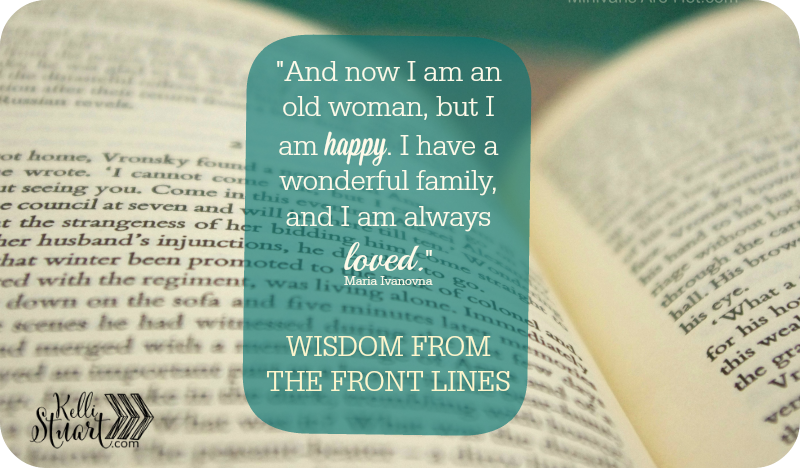
This is the final installment in my series of stories from Ukrainian World War II survivors. I leave you with Maria. I first heard Maria’s story as a sixteen year old, while on a mission trip to Kiev, Ukraine. Her story sparked a passion in me to know more – to understand better how this Great War affected the world.
Maria’s story is the one that started it all. My entire life shifted when I heard her retell of the days she was taken to Germany and forced to build artillery for the enemy. Maria was a delightful woman to speak with. Her eyes danced, moving in rhythm with her words. I will forever be grateful to her for entrusting me with her history.
A story I now share with you.
“The morning came when we were to go to the station. My sister Anna and I left together. My older brothers were already gone, fighting on the front for our safety. Papa was very ill so he could not accompany us.
When we arrived [the Nazis] forced us all to stand in line for hours while they walked around screaming at us. Finally, we were inspected and separated onto different trains.
When I reached the front of the line, a German woman grabbed my hands and inspected them. She did the same to Anna. I found out later that they were looking for young girls with large hands who would be good at physical labor. I guess my hands were what she wanted because as soon as she looked at them, she pulled me away and pushed me onto a train by myself. Anna was sent to another train. I thought I would die of grief and fear that day.
I was only fourteen years old when they sent me away to work in an underground chemical plant. There were many other children there with me. Our job was to fill German bullets with gunpowder all day long. During that time, I never saw the light of day.
We worked long hours with very little food. For some reason the other children in the camp turned to me for support and protection. I don’t know why I was given so much responsibility, but I felt that I could not let them down. I soon became very angry as our captivators cut back our meals from two per day to only one per day. And worse, the food was often infested with bugs. We were all ill, and some children even died. I had to do something.
I refused to work one morning and, using broken German, I demanded better treatment. Instead, the two officers in charge beat me very badly. It’s a miracle that I survived.
I woke up days later. A young woman washed my face and as I began to stir, she sang to me. Her voice was beautiful, and I thought she must be an angel. It turns out she was a young German nurse who took pity on me, and had been nursing me to health.
I was sent to a textile factory after I recovered. This was a much nicer job. I was given regular meals and the work was easier. But I didn’t stay there long. After only a few months I was transferred once again, this time to a tank plant. Here I helped assemble German tanks. This was terrible work for a sixteen year old girl.
A few months after I arrived, word came that the war was over. The next day, I tasted freedom for the first time in two years. I walked out of the terrible camp with great joy, and also great fear. I didn’t know where I was or how to get home.
After a few days of wandering, I came to a train station. As a refugee, I had to sneak onto a train just before it left. I rode wherever I could find room. Sometimes, I could not find room inside a train car, I and was forced to hang on to the rails outside the car for hours.
After two years of near starvation and hard labor, I finally arrived home. It was many weeks before I found my family again. And I found them quite different.
My brothers were all killed in the war. My father had been sent to Babi Yar (a killing ditch outside Kiev, where the Germans killed over 33,000 Jews in three days). He survived this awful place, but not without emotional pain that haunted him. The life went out from his eyes. He tried desperately to continue to be strong for us girls, but he felt defeated. He missed my brothers very much.
Anna survived her years in Germany as well. She had a better time than I did. She was a servant in the house of a wealthy family. She was treated with some kindness though she was often scorned and abused verbally.
Those were very hard years for our country. No one was untouched by tragedy. Everyone lost a loved one. But we survived and we persevered. And now I am an old woman, but I’m happy. I have a wonderful family, and I am always loved.”
by Kelli Stuart | Faith, Life, Novel, World War II, Writing
Benjamin Semenovich Shapolov grew up in Southern Ukraine, near Odessa. Raised in a family of Bible-believing Christians, Benjamin’s story is unique and awe-inspiring. A well-educated man, Benjamin worked hard throughout the war to protect and save the Jews in his area from both the Germans and the Soviets. His life was miraculously spared on numerous occasions.

I will never forget the afternoon I spent with this warm, gentle man. He had a kind face, large eyes, and a mouth prone to wide smiles.
This is his story:
I was born into a family of believers, and I knew the Lord from childhood. My grandparents and parents both taught me strongly to keep the gospel. I was accustomed to look for, and recognize, the will of God.
Right after my father died (in 1932), the horrible famine of the 1930’s began. My mother was left with seven children and herself to feed. It was in these conditions that we lived when the war began. We were always in need – always hungry. We often had only weak soup to eat, but the Lord faithfully kept us through that time and no one died.
In 1937, when I was fifteen, my uncle brought me into the city (Odessa) to live with him. In 1939, I returned to my mother’s village in the northern region of Odessa as a qualified accountant.
The collective farm that my family lived on nominated me to be their bookkeeper when I returned. Though I was only seventeen, I was well-educated and willing to help.
Before he died, my father had a good friend who was a Jew. They often sat in one another’s company and sang hymns together. Early on, our Jewish friend asked the leader of the collective farm to help him build a canteen on his property. When asked why, this Jew replied that a war with Hitler was fast approaching and this canteen would be a hiding place for the Jews.
The leader of the farm agreed to help and for years this canteen was host to many hiding Jews. This was a secret – very few people knew about it. Throughout the war, someone hid inside that canteen everyday.
Because I was the official bookkeeper of the collective farm, it was my duty to issue passports to the villagers. I and the leader of the collective farm both believed in God and we decided to issue all Jews passports in order to help them.
The Soviets frowned upon giving passports to Jews, but without this proper documentation, they were at the mercy of the fascists. The leader and I decided it would be better to save our countrymen by issuing them passports than to submit to the law of the Soviets. By issuing out those passports, we were able to save over three hundred Jews in our region.
When we developed these passports, we always left off the fact that a person was Jewish. Sometimes we had to change a man or a woman’s name from a Jewish name to a Ukrainian name. Now this was very dangerous work, but I always knew that I was following the plan of the Lord and I pressed on without fear.
Three times we were betrayed for doing this work, and each time we were sentenced to be hanged. But the Lord saved us every time, because the Commandant of the German regime who was assigned to our village was a believer in Christ. His mercy saved us, and we continued to help the Jews.
In 1944, the Germans left our village and the Soviet Army came. The Soviets demanded to know how so many people in our village survived the occupation so we gave them the list of names of the people that we had saved. We thought that perhaps we would be commended for our actions, but instead they looked at the list and spoke to us harshly.
For our actions of saving the Jews, the Soviets sent us to a penalty battalion to finish out the war.
We were sent to the front line without any weapons. We were told that the only way we could be redeemed was by our blood. If we were wounded, then our blood would redeem us. If we were killed – our life would redeem us.
So [at the age of 22], I was taken to the front line without protection. Without armor or weapons, we had to get very creative in our battle tactics.
We took empty cans and boxes and cut holes in them so that when we threw them they whistled, sounding like incoming bombs. We frightened the Germans so much that they ran, leaving behind all their weapons and armor. We didn’t have to fire a shot and they all left.
The Lord saved me many times in those years, and by saving me, he saved many other people. Those are only the main important points of my personal history. There are many other stories, but the most important thing to remember is that the Lord saves.
Because I began my service in the Red Army in the penalty battalion, I was never recognized as being a Soviet soldier. But that doesn’t matter to me now. It means nothing to me.
I care only of the Lord’s saving grace.





 Because their stories offer the connection between then and now, and in a time when evil runs rampant and we watch the world with wide eyes, a reminder of man’s capacity to overcome evil is beautiful, indeed.
Because their stories offer the connection between then and now, and in a time when evil runs rampant and we watch the world with wide eyes, a reminder of man’s capacity to overcome evil is beautiful, indeed.


